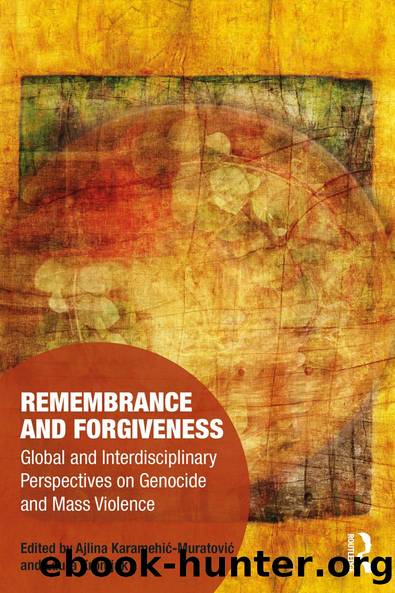Remembrance and Forgiveness by Ajlina Karamehić-Muratović Laura Kromják

Author:Ajlina Karamehić-Muratović, Laura Kromják [Ajlina Karamehić-Muratović, Laura Kromják]
Language: eng
Format: epub
ISBN: 9780367351014
Barnesnoble:
Publisher: Taylor & Francis
Published: 2020-10-27T00:00:00+00:00
9 The politics of forgiveness and bearing witness after a genocidal war
Three short films from Bosnia-Herzegovina
Keith Doubt
Introduction
One way to distinguish short films from feature-length films is to point out that they are shorter. There are also other ways to distinguish short films. Short films are non-commercial, allowing a greater degree of artistic freedom. Short films are like paintings, photographs, or poems in terms of their structure and content. They capture an unforgettable moment, share an epiphany, or depict the sublime. What perhaps is most poignant about short films is simply their desire to say something. They seek to influence their audience in a momentous way (Cooper & Dancyger, 2005).
Short films flourished as an art form in Eastern Europe. Zagreb Film is renowned for its short animated films with sharp, witty commentaries on modern social life. After the 1992â1995 war in Bosnia-Herzegovina, the art form was sustained through the works of Ahmet ImamoviÄ, Slobodan GuluboviÄ Leman, and Samir MehanoviÄ. Their work serves a function within Bosnia-Herzegovina and the wider world. They recollect memories during the war. They place traumatic events from the war so as to disassociate without forgetting. They move viewers to a stronger sense of well-being, one that is neither denial nor fixation. The short films empower a deeply violated society.
The politics of forgiveness is a challenging concept. On the one hand, in its ideal form forgiveness is not the least bit political. Forgiveness justifies itself for its own sake. Forgiveness is pure. It is independent of instrumental reasoning where forgiveness would seek some end independent of itself. On the other hand, politics avoids forgiveness if it can. Politics holds others responsible for the consequences of their actions, maintains oneâs advantage vis-Ã -vis another, and anticipates the consequences of oneâs actions by making rational decisions based on such circumspection.
How then are we to understand this paradoxical phrase âthe politics of forgivenessâ? What is its structure? Its logic? First, this study presents a sociological argument as to what is meant by the politics of forgiveness, and how such an oriented course of action is achieved whether in art or everyday life. Then, providing telltale examples of this argument through tight and exegetical accounts of three short Bosnian films made after the war from 1992 to 1995, the study accounts for the politics of forgiveness in its best sense.
Download
This site does not store any files on its server. We only index and link to content provided by other sites. Please contact the content providers to delete copyright contents if any and email us, we'll remove relevant links or contents immediately.
| Anthropology | Archaeology |
| Philosophy | Politics & Government |
| Social Sciences | Sociology |
| Women's Studies |
Born to Run: by Christopher McDougall(7120)
The Leavers by Lisa Ko(6945)
iGen by Jean M. Twenge(5408)
Sapiens by Yuval Noah Harari(5365)
Spare by Prince Harry The Duke of Sussex(5176)
The Kite Runner by Khaled Hosseini(5168)
Machine Learning at Scale with H2O by Gregory Keys | David Whiting(4292)
Bullshit Jobs by David Graeber(4179)
Never by Ken Follett(3937)
Goodbye Paradise(3798)
Livewired by David Eagleman(3764)
Fairy Tale by Stephen King(3370)
A Dictionary of Sociology by Unknown(3073)
Harry Potter 4 - Harry Potter and The Goblet of Fire by J.K.Rowling(3060)
The Social Psychology of Inequality by Unknown(3018)
The Club by A.L. Brooks(2919)
Will by Will Smith(2908)
0041152001443424520 .pdf by Unknown(2843)
People of the Earth: An Introduction to World Prehistory by Dr. Brian Fagan & Nadia Durrani(2727)
